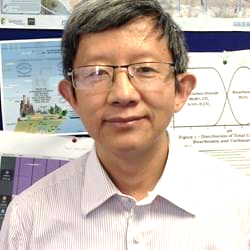Food-Energy-Water Nexus – a systems engineering approach

An event from the CRES webinar series: Tuesday, 28 September 2021 at 15.00 BST.
Food, energy and water are among the most essential requirements for the thriving of every society. Although conventionally they are supplied by different economic sectors, the challenges facing their secure supply are highly interconnected, due to the significant energy and water consumption in food production, the mutual footprint between energy and water production, and the intertwined connections of the three sectors with land and the broader ecosystems. The interconnectedness between the three sectors has been depicted by the term ‘food–energy–water (FEW) nexus’, as a concept helping to raise awareness of the inseparable challenges and to frame the needs for an integrative approach.
This talk will review the challenges associated with the FEW nexus and present our research in applying a model-based systems engineering approach to the analysis, design and assessment of the FEW nexus, particularly focusing on local/regional FEW systems and the resource nexus associated with urban agriculture.
The speaker: Prof. Aidong Yang joined Oxford in 2014 as a University Lecturer (Associate Professor) in the Department of Engineering Science, and as a Research Fellow of Green Templeton College. Before moving to Oxford, Aidong was a Senior Lecturer in the Department of Chemical and Process Engineering at University of Surrey, where he started as a Lecturer in 2007 after working as a postdoctoral researcher in a number of academic organisations, including Chinese Academy of Science, Louisiana State University, RWTH Aachen, and University of Newcastle Upon Tyne. Aidong studied Chemical Engineering in Hebei University of Technology and Dalian University of Technology and received a Bachelor’s degree and a PhD in 1992 and 1997, respectively.
Aidong’s research interests lie in developing methods and tools for modelling chemical/biochemical processes and related systems and in applying models and other systems engineering approaches to support the development of sustainable energy, engineering and manufacturing systems.
For more information, please visit cres-society.org
Other news stories
Associated people


